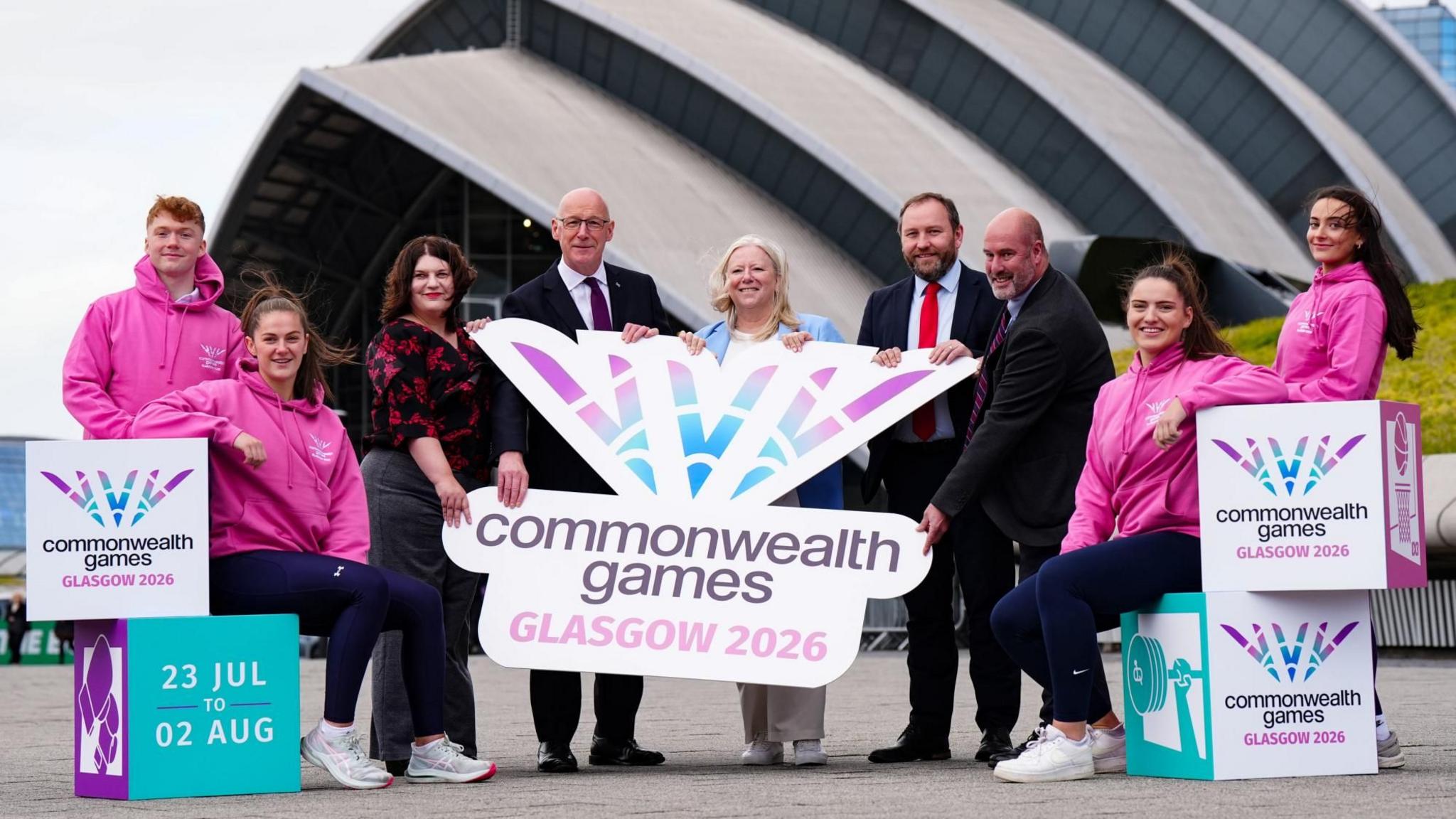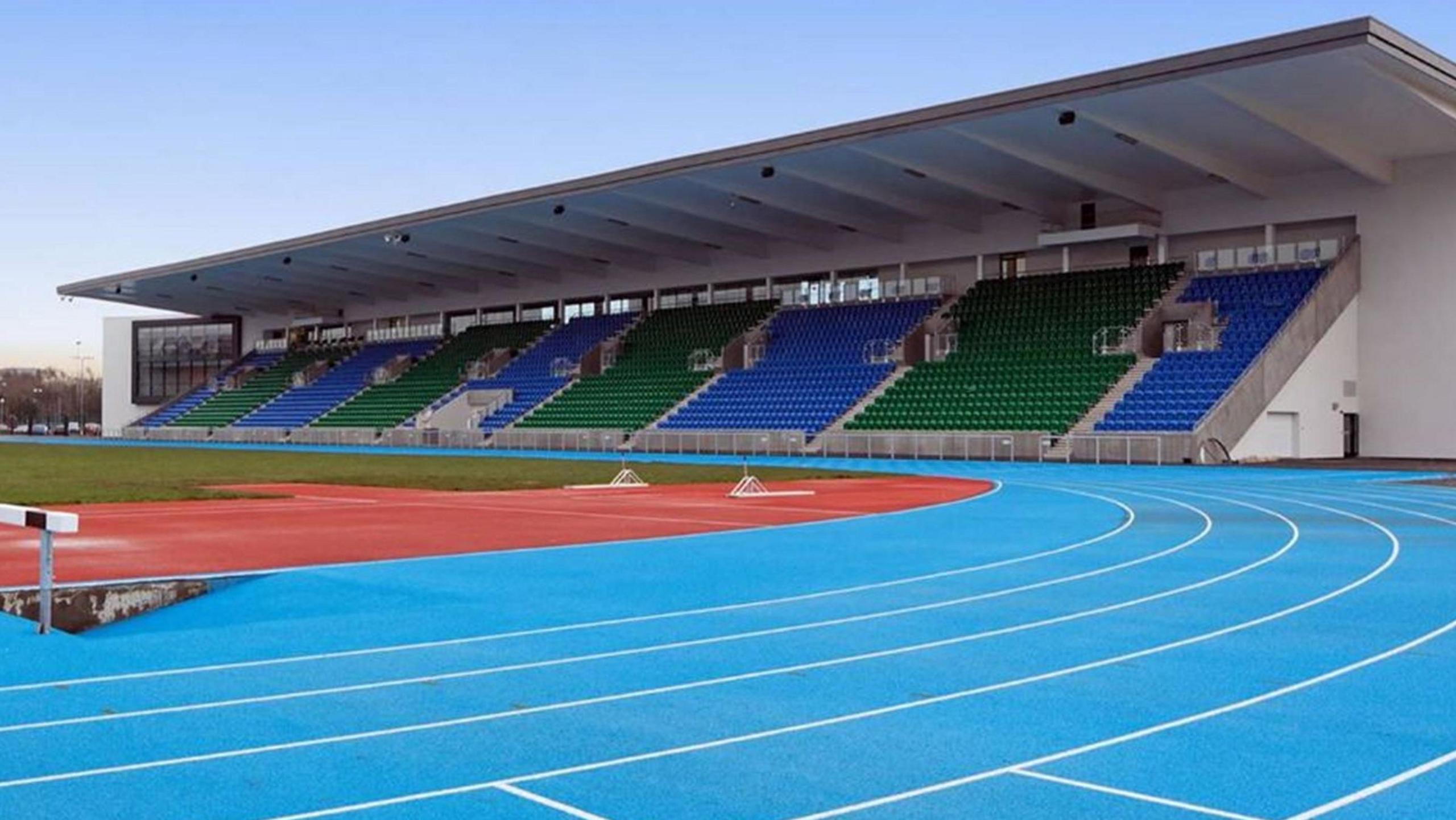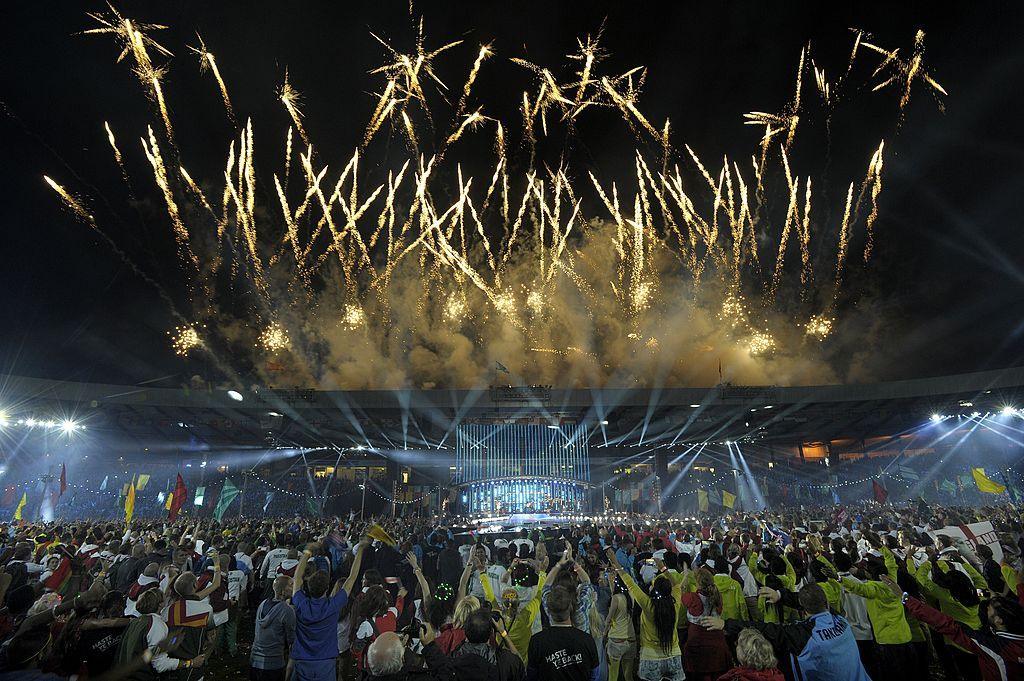How do the figures add up for the Commonwealth Games in Glasgow?

- Published
Glasgow has already won the gold medal for thrift - securing the Commonwealth Games with no competition and, we are assured, at no cost to the taxpayer.
The Games were originally due to be hosted by the state of Victoria in Australia - until it pulled out last year because of the rising cost, despite a large cancellation fee.
The bill for building venues and meeting the organisers' spec was said to be rising above 6bn Australian dollars (£3bn). The state's auditor general said that figure was overblown, while the original A$2.6bn budget was undershooting. The bill for cancellation has been calculated at A$589m (£302m).
Of that cancellation cost, A$380m (£190m) is going to the Commonwealth Games Federation, which is handing over more than half to stage the 2026 Games in Glasgow. The plan is for fewer sports in four venues.
How will the finances stack up?
A lot has still to be worked out, but the deal with the Scottish government was for about £100m to be spent on the Games in Glasgow.
The final negotiations were resolved by an additional £2.3m. For such a big project, margins are tight.
In addition, it is estimated that £30m to £50m can be raised from a combination of ticketing, sponsorship and broadcasting rights.
Yet it is hard to tell how much a scaled-down Games, without the previous pizzazz at and around the sports venues, will be as attractive to sponsors and broadcasters.
What will be spent - and what won't be included?
Some of the fund will pay for improvement to the facilities at Scotstoun stadium in Glasgow's West End. The Tollcross swimming centre, which was used in 2014, will require some refurbishment.
That avoids the cost of building a false floor at Hampden Stadium, nearly two metres above its football pitch. The running track required more space than the pitch, and extended to the lower tiers of seating. The total cost of adapting the arena in 2014 came to a reported £20m.
There should be less need to spend on the Sir Chris Hoy Velodrome or the neighbouring Emirates arena.
The rough budget, we are told, will cover security - but marathons and road cycling are casualties of the cost of stewarding crowds in the city streets.
More significant could be what is not spent.

Improvements are to be made at Scotstoun stadium
The big ticket items at such sporting events are often the infrastructure, some of which is only loosely connected to two weeks of sport, and might have been coming anyway.
The 2014 Games bid included a pledge to improve transport by completing the M74 motorway through south-east Glasgow. It brought new housing for competitors, now the homes of Glasgow citizens.
The Birmingham Commonwealth Games of 2022 included a new £73m aquatic centre, £72m spent on the main stadium, and a continuing £700m spend on the Perry Barr area of the city for housing, transport and facilities including a new secondary school.
In two years' time, Glasgow's transport may look similar to 12 years before, just with more cycle lanes, electric buses and potholes.
Thousands of available rooms in the city have been added in the hotels sector and in student accommodation. The COP26 environment summit in 2021 showed just how big an event Glasgow can handle.
Will there be sponsorship and broadcast rights?
That's an important part of the finance package - perhaps as much as a third of the income required for putting them on. However, a scaled-down Games will almost certainly be less attractive to both sponsors and broadcasters.
Major sponsors of the 2014 Games say it is too early to say if they will be involved again.
A spokesperson for AG Barr, the makers of Irn Bru, said: "It's great news that the Games are coming back to Glasgow - the city put on a phenomenal Games in 2014 and we were delighted to be part of that.
"Clearly this is very new news and we look forward to having discussions to see if we can be part of Glasgow 2026."
Perth-based SSE was also a headline sponsor, but since 2014 it has sold its retail division and has less need of a public profile.
BP was a sponsor of the Games, Team Scotland and Team England in 2014. Since then, such oil and gas producers have been shunned by some high-profile cultural events and are more wary of the potential for action by environmental protesters.
That action can extend to elite sportswomen, who are protesting the sponsorship of Fifa football by Saudi oil giant Aramco.
Others with links to fossil fuels, weapons or Israel, however limited, including a finance house such as Baillie Gifford, have also found their brands attract controversy more than positive profile.
Badminton and hockey miss out as Commonwealth Games sports confirmed
- Published22 October 2024
Glasgow 2026 Commonwealth Games - What do we know so far?
- Published22 October 2024
Ford was a headline sponsor in 2014 and is not planning to return.
It shows the problem the Glasgow organisers have in seeking funds with less than two years to go, as sponsorship funds may already be committed.
By contrast, the Glasgow Games of 2014 was announced in 2007, when the bid process itself could involve sponsors.
Ahead of that Games, the Scottish Parliament passed a law protecting the branding and rights of advertisers, effectively blocking non-advertisers from free-riding on sports and other events. It is likely that will be required again.
Broadcast rights can be sold to Commonwealth nations, although the UK audience will outnumber others.
The Commonwealth Games are only partially protected for terrestrial broadcast. While some other "crown jewel" sporting events - like the Olympics, Wimbledon, the Grand National and Scottish Cup final - have to be on live terrestrial television, the Commonwealth Games could be bought out by a paid-for subscription service.
That would have to be on the condition that delayed broadcast or edited highlights would be available to terrestrial broadcast. So if there is competition for the rights, a non-terrestrial broadcaster, such as Sky or BT, could increase the budget available to the organisers, but reduce the potential live audience.
Is this an opportunity for businesses?
There may be no public money involved, but it's a big opportunity for the private sector.
Games come with a lot of local requirements: building, construction and scaffolding; accommodation; transport providers, vehicle rentals, taxis and airports; temporary catering; and souvenir sales. The media and advertising sector also gains.
Glasgow Chamber of Commerce is looking to the Games Federation promise of funds for "activation" - some kind of fanzone and entertainments stages, bringing work for the cultural and entertainment sector.
Stewards will be required - some paid, many of them volunteers.
And both participants and audiences go shopping and dine out, so that can only bring good news for Glasgow retail and restaurants.
The chamber also had a good experience from running events in 2014 that showcased its members' offer to visitors.

Fireworks lit up the sky during the closing ceremony of the 2014 Commonwealth Games at Hampden Park
If it brings investment and profile, the boost can go well beyond two weeks of competition.
The Commonwealth Games were the base for attracting other big sporting occasions to Glasgow. This included athletics and cycling, as well as conferences and events, peaking with COP26.
Birmingham sought to learn from Glasgow's experience, and can claim to have a similar lasting effect.
The idea behind the stripped-back Glasgow 2026 is that it creates a model for a different type of multi-sport event, and one that makes it possible for more and smaller cities to bid for the Commonwealth Games and other events in future.
Unsurprisingly, business wants to see government dip its hand in its pocket to help this process.
Leon Thompson, executive director of UK Hospitality, representing the sector in Scotland, says: “The Games will deliver an economic boost to Glasgow, as well as creating opportunities to promote the city’s attractions over the next few years as it prepares to welcome visitors from across the world.
“A vital feature of delivering any major event is legacy, so it is imperative that Glasgow City Council works with our businesses to look at how the city can maximise the economic and reputational benefits of being host.”
Could Glasgow turn a profit in 2026?
That depends how you count it. The outlay in 2014 was £530m in capital spend and £473m spent by the organising committee.
Four years after the 2014 Games, the Scottish government published an assessment which calculated that they generated £740m of economic benefit, of which £490m was to the benefit of Glasgow's economy. An average of 2,100 jobs were involved in preparing and delivering the Games, peaking in 2014.
This was reckoned to be similar to the impact that could be expected from spending the same amount of government money without the Games.
But there are intangible benefits in reputation and tourism appeal, as well as skills gained, with linked employability projects aimed particularly at young people.
The assessment suggested there's a risk of overspinning the business prospects in advance. However, spin-offs for Scottish business included not only three-quarters of the £669m of principal contracts awarded for the 2014 Games, but the experience that helped some companies win contracts in other sporting events, in Scotland and beyond.
Economic analysis from Birmingham University suggested that city's Commonwealth Games generated a net profit of about £100m, on a budget of £778m.
Some £594m came from central government, while the city council and its partners paid £184m.
Another government-commissioned study found the Birmingham event contributed at least £870m to the UK economy, and £454m of that was spent in the West Midlands.
One aim is to scale back the Games so that other cities can bid in future. But if they become financially viable only because the infrastructure is in place, one possibility is to follow the Ancient Greek example, and hold them in the same place. Multi-sports events could be like tennis tournaments.
What could possibly go wrong?
Could the event be run on such a tight shoe-string that it damages Glasgow's reputation? The figures may not add up, and the Games organisers could run into financial difficulties.
The Commonwealth Games Federation is not saying where the liability for that will lie, but it doesn't look like either UK or Scottish governments or the city council are willing to be the last resort if things go badly.
That brings to mind the 1986 Commonwealth Games in Edinburgh.
Returning to the Scottish capital after only 16 years, the Games were hit by a boycott. More than half the Commonwealth's members, across Africa, Asia and the Carribean, protested at the UK government's support for sporting links with apartheid South Africa.
Facing a deficit, the chairmanship of the organising committee was taken over by the notorious proprietor of the Daily Mirror and Daily Record, Robert Maxwell.
He promised a multi-million pound injection of his own funds - but true to form, he failed to pay more than £250,000, and probably secured that much value in promoting his papers and himself.
The 1986 Games did not go well.